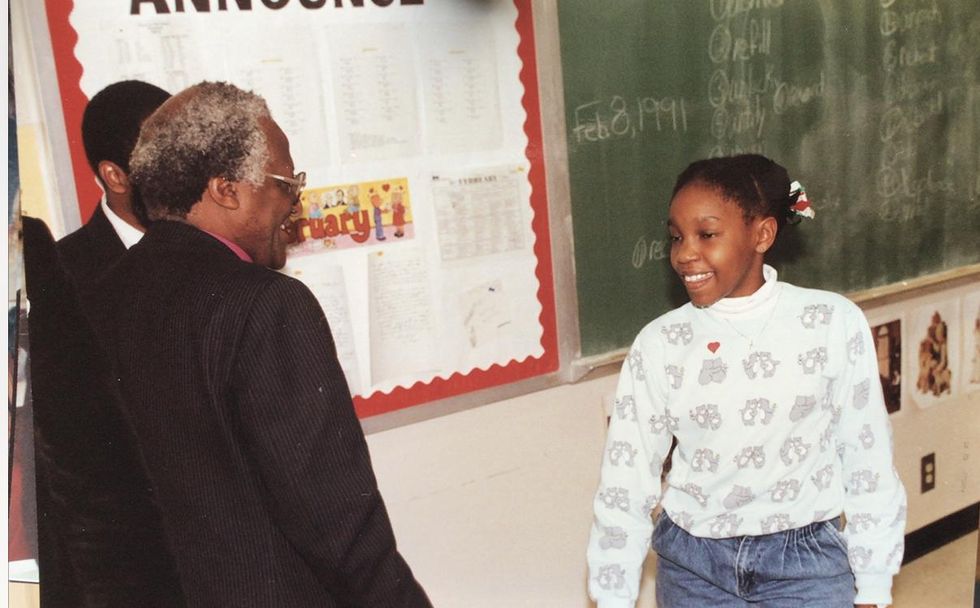A South African Professor Recalls Exchanging Letters in Exile with Archbishop Desmond Tutu
With Archbishop Desmond Tutu being laid to rest this past weekend, a professor, who moved to Atlanta as a young child with her family during apartheid, remembers the personal memories she has of "Uncle Des."

At the age of 7, Tshepo Masango Chéry began corresponding with Archbishop Emeritus Desmond Tutu
When I was in the first grade, I invited Archbishop Desmond Tutu to visit my class. Three years later, he showed up.
As a seven-year-old, living in my new home in Atlanta, I had found a children’s biography of Archbishop Tutu in my school library. I promptly wrote my name on the little card in the back cover and borrowed it. Tutu’s story hit especially close to home, partly because it was—I had fled South Africa without my parents at the age of six because of my parents’ own engagement with the anti-apartheid struggle.
Thinking back to that time, I believe both the presence of the book and Tutu’s story made room for me to tell my own story to my new peers; for me, this book cultivated a sense of belonging. I had a feeling that his radical vision of non-racialism, so simply explored in the book, was something connected to yet distinct from the familiar histories of the Civil Rights Movements that were such a key part of our education in Atlanta. Not only was Tutu committed to the idea of non-racialism—which the writer Sisonke Msimang deftly describes as “a peculiarly South African phrase describing a utopian vision that went beyond equality and spoke to a deeper desire to connect with authenticity across racial, ethnic, class and gender divides”—he also expanded our understanding of how integrationist politics did not preclude Black suffering.
As a seven-year-old, I felt connected to Tutu’s story, and I believed that he could make sense of mine. So I invited him to come visit—for show-and-tell. He even wrote me back and said he would come. Although it took awhile—I was then a fourth-grader and nine years old—Archbishop Tutu walked into my elementary school and turned it upside down. Only then did I realize that the Archbishop from the biography had worked with my father back home in South Africa. When Tutu arrived, I proudly walked him to my first-grade teacher’s classroom. “Oh my God,” exclaimed Mrs. Miller, to which he mischievously answered, “I am not God, I am only the Bishop, Madame.” The visit began a lifetime of exchanges and moments where Archbishop Tutu showed up for me and reminded me of our shared struggle back home.

I continued to write Uncle Des, as I soon came to call him, periodically throughout my life. He offered support as I applied to college. He helped officiate at my wedding. When I completed my PhD dissertation, the Tutus were among the first to congratulate me with flowers. These small gestures made an indelible mark on my life.
This year, I lost seventeen family members. As the deaths mounted, I wanted to go home, to South Africa, to mourn and bury my dead. But COVID 19-surges on both sides of the Atlantic have kept me in America. My Uncle Des is my most recent loss, but it’s different this time. His passing marks a moment in my nation’s history, in which all South Africans know that most of our struggle heroes are gone; our lives will be configured differently.
Predictably, all of us celebrate the Archbishop’s professional legacy. Indeed, he alongside others took the helm of the anti-apartheid movement during the tumultuous 1980s, when the state forced our political leaders into exile, or banned, incarcerated, and killed them. His life’s work—whether as the leader of the South African Council of Churches or the head of the Truth and Reconciliation Commission, among other positions—radically insisted on Black humanity in the face of gross injustices and violence.
We are indebted to Desmond Tutu and so many others who took on this political burden out of their own moral conviction. But today, and in the days to come, I want to remember the Tutu that defied the definitions of an international icon by making room for seemingly invisible but life-changing moments, like the quiet exchange of letters with a young child.
Tshepo Masango Chéry is an Assistant Professor of History and African American Studies at the University of Houston. She is writing about religion and Black liberation struggles in South Africa in the forthcoming book, Kingdom Come: The Politics of Faith and Freedom in Segregationist South Africa and Beyond (Duke University Press).

